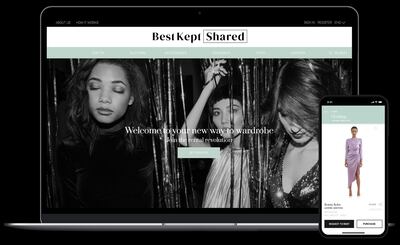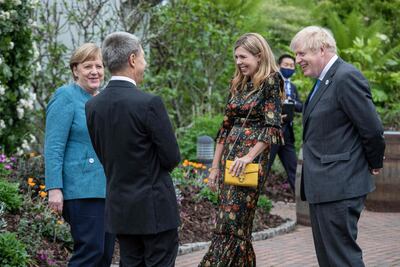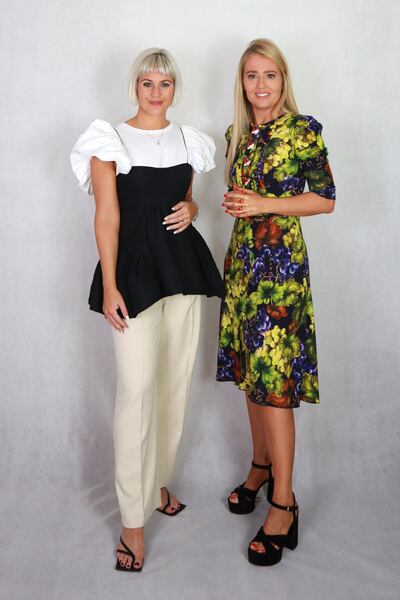At the recent G7 Summit, Carrie Johnson – wife of British Prime Minister Boris Johnson – was widely applauded for her stylish and sustainable wardrobe choices, which included an array of outfits from designer rental platforms.
Two weeks earlier, she had worn a rented dress for her wedding. Many British tabloids are comparing Johnson's sartorial sway to that of the Duchess of Cambridge, but Johnson's approach to fashion could inspire attitudes that run deeper than mere aesthetics. A turn to eco-friendlier fashion on the political red carpet may trickle down to the masses, where the market for rental fashion is already burgeoning.
The global fashion rental industry was valued at $1.26 billion in 2019, according to a Research and Markets’ Online Clothing Rental Market report, and is projected to reach $2.08bn by 2025. Numerous fashion start-ups have entered this space, both globally and regionally.
In Dubai, Sophie Kjoller and Kelly Power are the founders of Best Kept Shared, a peer-to-peer luxury fashion rental platform launching in July and aiming to become the “Airbnb of designer fashion”. The “social style of shopping” will feature women’s designer clothing, handbags and accessories from members’ closets, and will be initially available to a closed community.
The pair trialled the concept in December for New Year's Eve as a market test, and found it to be a viable business model, despite the pandemic.

A sustainable solution
Sustainability is a key driver of this market.
"The fashion industry is the world's second biggest pollutant, currently accounting for around 10 per cent of humanity's carbon emissions and 20 per cent of wastewater," Kjoller tells The National. "On average we buy more than 50 new articles of clothing annually and roughly 50 per cent of those items will be worn three times or less."
The best thing one can do to reduce the environmental impact of their wardrobe, she says, is to increase the number of times each item is worn: “We believe that if you cannot wear an item at least 30 times, then you shouldn’t own it, you should rent it.”
The Guardian recently named rental fashion platforms "the industry's 2020 success story", but entrepreneurs have been laying the groundwork for the past half-decade.
In 2016, Shika Bodani, who lives between Dubai and London, founded Front Row, a luxury on-loan service in the UK, to “democratise” designer fashion. She believes that the pandemic has helped fuel demand for fashion that’s affordable, accessible and sustainable.
“The pandemic further polarised views around materialism, over-consumption and sustainability. The rental model appeals to a more sustainably minded generation and has benefits to both consumers and brands,” she explains.
The luxury twist
The rental start-ups currently in vogue are a far cry from the dowdy thrift shops of old – with their focus on luxury.
Dubai fashion-for-hire platform SW One for instance, founded by Sawsan Waleed, stocks couture and ready-to-wear gowns by brands like Gucci, Valentino and Zuhair Murad (including gowns and clutches that are one-off pieces), sourced from the world’s fashion capitals.
While many are available only in one size, SW One offers alteration services for the ultimate “red carpet” styling experience. Waleed points out that besides being cost-effective, an advantage of renting fashion is that it doesn’t require long-term storage space.
And, with venues resuming pre-pandemic operations, and weddings and gala dinners back on the calendar, she believes the time is ripe for women to seek attire and accessories to rent for these occasions.
Front Row delivers a luxury end-to-end experience, inclusive of personalised customer service and luxurious packaging.
“We want our customers to have the same aspirational experience that they would get if they walked into a designer store,” says Bodani.
Best Kept Shared is also wrapping its humble concept with extravagance – a concierge service will wait outside a renter’s home once items are delivered, so that they can be tried on, as per the brand’s “fit guarantee”. All clothes are dry-cleaned before being returned to the owner.
Surpassing social stigmas
In the past, fashion rentals were tainted with scepticism in the Middle East. “Honestly, in the very beginning, customers refused to rent a gown if it was worn or rented previously, mainly because of the gossip, given that the community in the UAE is flooded with family and social events,” says Waleed.
But she and Bodani, who both launched their businesses in 2016, have witnessed a change in attitudes – renting and wearing pre-loved fashion has shed some of its stigma, especially when weighed with the eco-friendly benefits.
Kjoller reminds us that in the 1990s, vintage shopping was considered “cool” and borrowing clothes from friends was common. And while we may be witnessing a surge in fashion rental concepts in cosmopolitan cities across the globe, she believes it’s still a relatively untapped market in the UAE.
“Geographically, we are in a very unique location for fashion rental, with a high concentration of individuals who have under-utilised luxury items in their closets and an incredible demand from renters, thanks in part to our bustling dress-up-and-eat-out culture,” she says.
She envisions designer dresses and bags being the two most popular categories at Best Kept Shared, especially “statement pieces” that wouldn’t be worn that often by owners. Handbag renting has in fact emerged as its own micro-market niche, with regional players like Bagonista offering monthly membership packages and designer handbag rentals (Chanel, Dior and more) for as low as Dh200.
The double-edged sword of social media
Although social media is a major culprit of fast fashion, bloggers and trendsetters might just be the ones to help popularise fashion-renting platforms.
Power, co-founder of Best Kept Shared, says: “They have been expected to create and deliver content showcasing the newest pieces and trends on the daily and would be ‘shamed’ for wearing the same outfit twice… We’ve watched the rise of the Instagram ‘one wear’ phenomenon and the constant need for newness that it brings.”
However, fashion bloggers, she believes, are primely positioned to influence their followers to consume more responsibly.
“In 2020 something changed – we saw a movement take the social feeds by storm with influencers pushing back and promoting fashion circularity with trending hashtags like #rewear and #outfitrepeat,” she says.
This new generation of fashion enthusiasts deem environmentalism to be “on trend” and are looking for ways to become part of the sustainability solution, says Power, who has recruited influencers such as Ashley Al Busmait, Maha Gorton and Morgan Britt Butler in the UAE to be among the first members of the Best Kept Shared community.
“We’re giving them the opportunity to support fashion circularity, whilst also making an ROI (return on investment) on their initial fashion investments, and they jumped at the chance to join our closet in the cloud,” she says.
Although fashion rentals promote sustainability, they could still feed into the ego-driven demands of materialism, providing a way for women to constantly share photos of themselves in new ‘fits on the ‘gram' while saving money.
“With social media being so prevalent, there is a lot of pressure on the everyday woman to be seen in the latest branded clothing and never repeat an outfit,” says Bodani. “We’re ultimately giving them a ‘one-night stand’ with the fashion brand of their choice.”
This may just satiate the appetite of this generation of digital-savvy fashion enthusiasts, who devour a daily concoction of TikTok fashion videos, Instagram outfit posts and unboxing reels, and have been sucked deep into the ever-churning cycle of consumerism.



